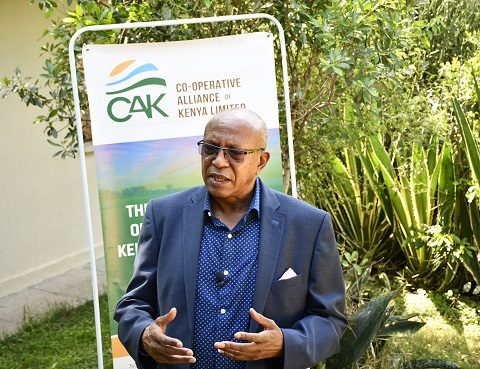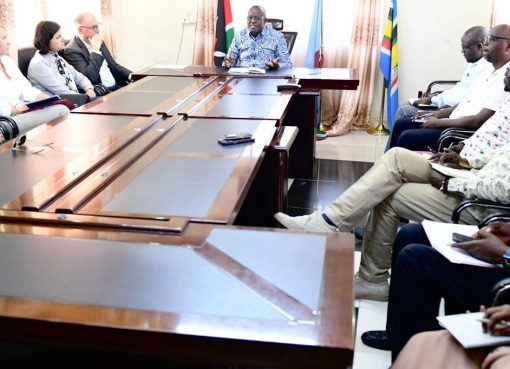Bee farmers in Nakuru earned Sh155 million from the sale of 448,854 kilogrammes of honey last year.
State Department for Livestock Principal Secretary Harry Kimtai said farmers within the devolved unit harvested 15,000 kilogrammes of honey wax.
Speaking during a Nakuru County Apiculture stakeholders’ workshop on Wednesday, Kimtai said the earnings would have been higher if farmers had the know how to extract bee venom and propolis which he described as unique products with a high demand.
“Bee venom is a colourless liquid that bees excrete through their stings which has been shown to have antiviral, antibacterial and anticancer effects in some studies. Propolis is a resin-like material used by bees to build hives and has for thousands of years been used to fight infections and heal wounds,” explained the Principal Secretary.

He singled out drought, coupled with a decline in bee populations, deforestation and poor farming practices as key factors causing a decline in honey production in the country.
The Principal Secretary expressed concern that new pests and diseases and indiscriminate use of farm pesticides have hit bee colonies hard, making beekeeping a decidedly less sweet venture for farmers.
“We are working with devolved units to reverse the worrying trend of bee colony decline. Initiatives aimed at bee colony multiplication include capacity building, provision of bee keeping equipment and bee bulking. In Nakuru County we have teamed up with 200 bee keepers,” revealed Mr Kimtai.
The platform, aimed at enhancing a smooth scrutinized flow of operations by various stakeholders across the beekeeping value chain brought together various players including beekeepers, scientists and processors, marketers among others.
The stakeholders pointed out key issues affecting the sector as lack of standardized prices, competition from neighbouring countries, bee diseases among others.
They also noted the need to boost honey production to sustain the growing demand.
Director Livestock Production, Mr. Julius Kiptarus affirmed that the national government was committed to supporting forums that promote bee keeping as an alternative way of making money as climate change brings harsher weather.
“We will need to build the capacity for all stakeholders and encourage bee farming as a way of boosting food security and enhancing economic empowerment especially in rural areas.
This should be coupled with planting a diversity of plants and indigenous trees in beekeeping areas, preventing deforestation and adopting farming practices that avoid the use of pesticides during the flowering period,” said Kiptarus.
The National Government has already donated 40 hives (20 Kenya top bar hives and 20 Langstroth hives), 10 harvesting gear and two honey extractors to beekeeping groups in Njoro and Naivasha Sub counties.
County Executive Committee Member for Agriculture and Livestock, Dr Immaculate Maina said the multi-stakeholder platform would ensure a uniform honey sector even when agriculture is devolved.
This, she added, would boost quality and quantity of honey and its products in the country.

“As stakeholders, we are ready to work jointly in a bid to ensure quality production and an expansion of both local and international markets,” she said.
Dr Maina sought to reassure farmers that the National Agricultural and Rural Inclusive Project (NARIGP) being implemented in five sub-counties namely Kuresoi-North, Molo, Naivasha, Njoro and Bahati will transform bee keeping into a profitable venture.
The NARIGP project she stated, is designed in an innovative way that brings together the National, selected County Governments and World Bank to chart ways of empowering small-holder farmers economically for social inclusivity.
“The programme is aimed at enhancing a smooth, scrutinized flow of operations by various stakeholders across the beekeeping value chain and will consist of various players including beekeepers, scientists, processors and marketers among others. This will boost quality and quantity of honey and its products in the country,” said the Agriculture CEC.
Elsewhere, Prof. Rhoda Jerop Birech, an expert in Sustainable Agriculture at Egerton University and a board member of Organic Consumers Alliance (OCA) noted that the importance of bees in the lives of humans is always underestimated and enough is not being done to protect the insects.
“While the world’s population is increasing day-by-day, the population of bees is steadily decreasing,” she warned.
Prof. Birech singled out exposure to toxic chemical pesticides through insecticides, herbicides, fungicides and other synthetic toxins used in industrial agriculture as the biggest threats to bee health.
“One of the simplest ways to conserve our bee populations in an agriculturally reliant world is through organic farming. Organic farming standards largely prohibit use of synthetic pesticides and promote use of Integrated Pest Management (IPM) techniques. Some pesticides weaken the bee’s immune systems by making them defenseless against viruses.
The Egerton University don further noted that bees play a significant role in the pollination of fruit crops such as pawpaws, oranges and watermelons, which do well in arid regions increasing food security in the country.
“Bees are critical in providing pollination to crops, therefore, without them, we would not have food. Seventy-five percent of all crops grown for food rely on pollinators, mostly honey bees, for a successful harvest. Without pollination from honey bees, many fruits and vegetables will not be on our grocery shelves,” she said.
A researcher at South Eastern Kenya University’s school of Agriculture and Veterinary Sciences, Benedict Wambua established in a study that recurrent droughts were among the factors limiting the use of beekeeping as a climate coping strategy, largely because honey production fell in drought periods.
“Extreme climatic effects lead to low or postponed plant flowering time, reduces pollen and nectar availability, increases water stress, (and) inhibits movements and bee communications. During the prolonged dry spell, bees migrate and leave hives empty,” stated Wambua.
By Anne Mwale





